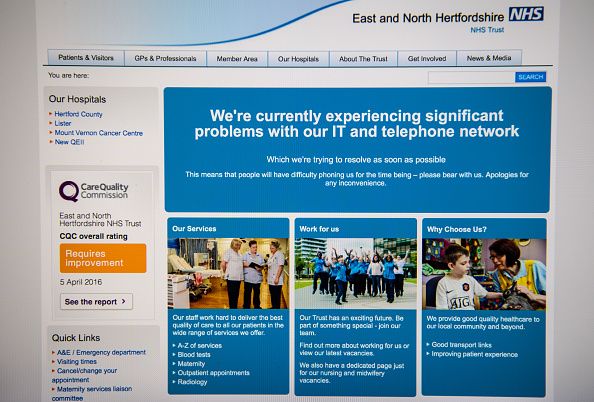
Business leaders around the world remain on high alert as a global cyberattack, unprecedented in its scale, was set to spread further this morning.
FedEx, Renault Nissan and Spain’s Telefonica are among companies that confirmed over the weekend their systems had been infected with the ransomware worm, dubbed WannaCry. Authorities estimate it has hit more than 200,000 computers in more than 150 countries.
The virus works by blocking victims’ access to their computers and demanding a ransom, typically of $300 worth of bitcoins, that increases over time.
Britain’s National Health Service was gradually getting its systems back on line over the weekend after the virus caused chaos at some hospitals on Friday, forcing patient operations to be postponed. Even so, authorities are concerned the virus could spread as people return to work this morning and switch on their computers, and amid fears new versions of the virus could be dispatched.
“At the moment, we’re in the face of an escalating threat.”
“At the moment, we’re in the face of an escalating threat,” Europol Executive Director Rob Wainwright told British broadcaster ITV on Sunday.
The massive attack, suspected to be the work of criminals, is perhaps the clearest signal yet that CEOs who haven’t already gotten serious about cybersecurity need to improve their strategy.
As recently reported by Chief Executive, a number of surveys indicate that companies across the world still have large gaps in their cyber defenses—perhaps given the cost and sophistication of the technology involved and difficulty sourcing talented individuals with a full grasp of the risks.
Improving defenses, however, need not always be a complex affair. Many of the computers hit by this most recent attack were more vulnerable to infection because they were still running on old operating systems, such as Windows XP.
Microsoft had already issued a protective “patch” against the virus this year amid revelations malware techniques had been stolen from the U.S. National Security Agency. The current worm is suspected to have stemmed from that theft.
“This attack is a powerful reminder that information technology basics like keeping computers current and patched are a high responsibility for everyone, and it’s something every top executive should support,” Microsoft president and chief legal officer Brad Smith said in a statement Sunday.
Microsoft on Saturday said it was taking “the highly unusual step” of providing a security update for customers using older platforms including Windows XP, Windows 8 and Windows Server 2003.
Its full guidance to customers can be viewed here.

Chief Executive Group exists to improve the performance of U.S. CEOs, senior executives and public-company directors, helping you grow your companies, build your communities and strengthen society. Learn more at chiefexecutivegroup.com.
0

1:00 - 5:00 pm
Over 70% of Executives Surveyed Agree: Many Strategic Planning Efforts Lack Systematic Approach Tips for Enhancing Your Strategic Planning Process
Executives expressed frustration with their current strategic planning process. Issues include:
Steve Rutan and Denise Harrison have put together an afternoon workshop that will provide the tools you need to address these concerns. They have worked with hundreds of executives to develop a systematic approach that will enable your team to make better decisions during strategic planning. Steve and Denise will walk you through exercises for prioritizing your lists and steps that will reset and reinvigorate your process. This will be a hands-on workshop that will enable you to think about your business as you use the tools that are being presented. If you are ready for a Strategic Planning tune-up, select this workshop in your registration form. The additional fee of $695 will be added to your total.

2:00 - 5:00 pm
Female leaders face the same issues all leaders do, but they often face additional challenges too. In this peer session, we will facilitate a discussion of best practices and how to overcome common barriers to help women leaders be more effective within and outside their organizations.
Limited space available.

10:30 - 5:00 pm
General’s Retreat at Hermitage Golf Course
Sponsored by UBS
General’s Retreat, built in 1986 with architect Gary Roger Baird, has been voted the “Best Golf Course in Nashville” and is a “must play” when visiting the Nashville, Tennessee area. With the beautiful setting along the Cumberland River, golfers of all capabilities will thoroughly enjoy the golf, scenery and hospitality.
The golf outing fee includes transportation to and from the hotel, greens/cart fees, use of practice facilities, and boxed lunch. The bus will leave the hotel at 10:30 am for a noon shotgun start and return to the hotel after the cocktail reception following the completion of the round.